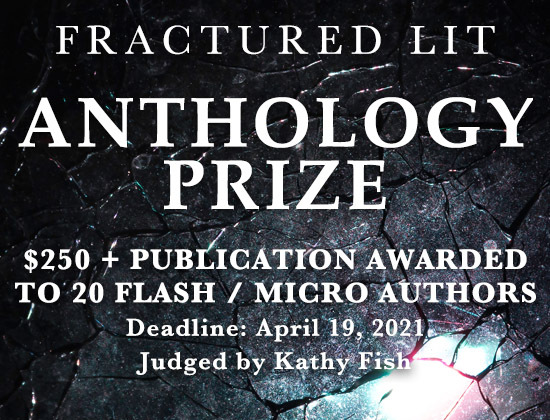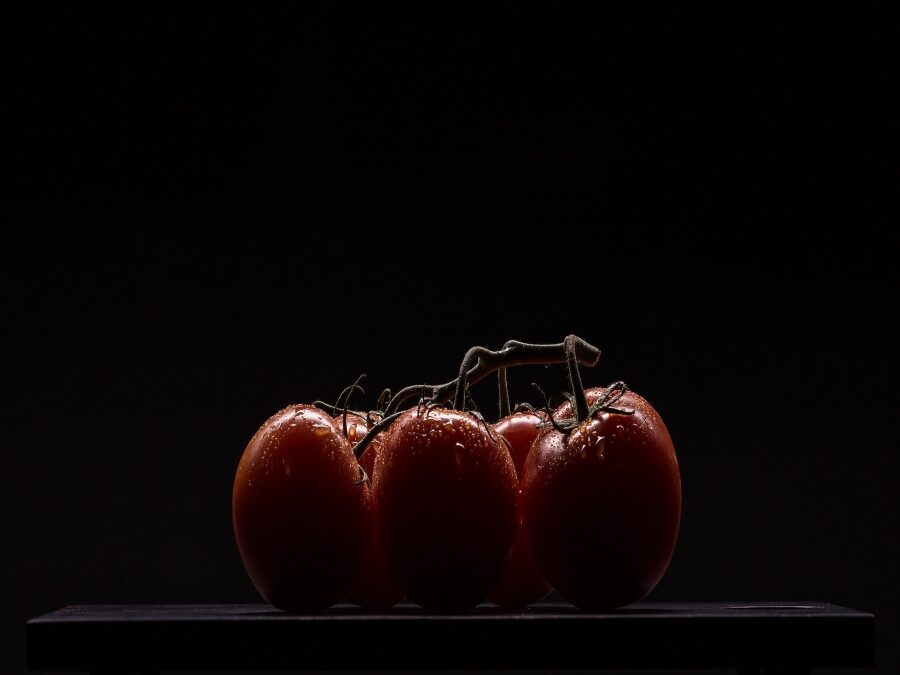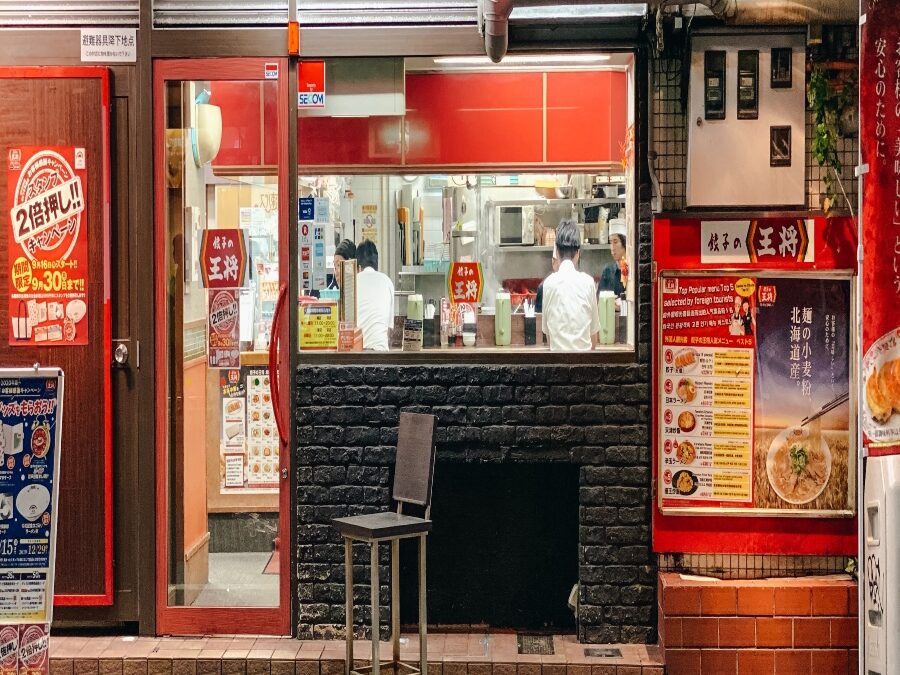
Protected: Welcome Video From Kathy Fish
Password Protected
To view this protected post, enter the password below:

To view this protected post, enter the password below:

The crab apples had disappeared from Sophie’s grove across the street last week, but I didn’t notice until Sophie got lice. They were easy to spot because she pulled her braids so tight, scalp bright and taut in the hairline, a barren main street that the tiny crawlers crossed after looking both ways. Like we always did when her mom came home smelling of motel soap or when my mom nervously warned me not to get too close to her kind of family, we climbed into the throng of reddening trees to strategize.
I already know who did it, she said, biting at the ends of her hair. It’s Mom’s new boyfriend Nikolai, who only showers once a week.
Ugh, I said, secretly imagining what it would be like to be so close to someone that a tiny insect could crawl from their crown to yours.
The only solution, she continued, is to cut it all down. By the time I realized that she was talking about the apples she was halfway down the trunk. We found the ax in the garage too heavy to swing, making only a shallow gash in the barklike a notch in a flute.
Sophie said we would think of something else.
The next week when I saw her she was very unevenly bald. She explained that Nikolai had suggested suffocating the lice with mayonnaise and clingfilm. That night, egg-haired and crinkly, Sophie had stolen into her mom’s bedroom and shaved herself with Nikolai’s razor.
We went outside with the crosscut saw I had reluctantly borrowed from my parents. The blade quickly stuck and I fell backward pulling it out of the tree’s stubborn new mouth.
Actually, Sophie, I don’t think you should do this, I said the next week, as she repeatedly scratched the matchstick across a rock. She knelt in the slimy October leaves while I stood yards away, running my fingers over the ax-gash in our first tree.
But it’s so perfect, she said. They’re Nikolai’s matches.
I just think you could get hurt.
Fine, she said, staring at me. You can just watch from your house.
I hesitated and then I ran. From my bedroom window that day and the days after I watched the sunset behind the inky boughs of the rain-wet grove, and Sophie squatting small and solid under her umbrella waiting for something to catch.

The End
Me at his door, trying to convince him I was a good person. But I wasn’t a good person back then, needy and egotistical, kind and then poisonous. On his doorstep that day, David told me I was like a creeping bellflower, a weed people mistake for a flower and let run rampant in their gardens. The problem is, he told me, a weed is a weed. I looked up creeping bellflower, and it did have beautiful bluebells crawling up its stalks. It also has an extensive root system, so it spreads quickly and chokes out the other plants. A weed is a weed.
Three Months Earlier
I surprised David with small gifts while I cheated on him with a fellow teacher, a writer who often dropped phrases like sign as both mark and meaning into conversation. I let him tease me for dating David, the school’s landscaper. The last gift I gave David was a cactus in a minuscule ceramic pot. The gift before that, a Zen garden with a Lilliputian rake. Before that, a dwarf Bonsai tree. That all of these gifts were miniatures seem a sign of the tightness of my heart back then, the smallness of who I was. Or maybe they signified nothing at all.
A Year Before
David helped me start a plot in the community garden, where we planted tomatoes and lettuces. When tiny leaves sprouted, he bent to inspect them, his hands deft as he pressed a leaf between thumb and forefinger. He gave me directions on watering and aeration, but I only half-listened, savoring the taste of words like bonemeal and humus. That I could grow anything astounded me, although I knew it wouldn’t be long before the plot burned out.
The Beginning
David and I ate lunch in the school’s garden—raised beds of beans, cucumbers and squash. He once plucked a fat heirloom tomato from the vine and held it up for careful inspection. Seeds are passed down each season to preserve desirable traits like juiciness or color, he explained, holding up the misshapen tomato, shades of purple and deep orange stretched across its skin. Each variety is genetically unique, and that’s what gives them a resistance to pests and diseases. The French sometimes call it pomme d’amour, he added, and offered me a taste.

Libertas Bayveen O’Connell
War Destroys A Man From the Inside Out Edie Meade
Look Sky, No Suburbs Meg Tuite
I Have Dreamed of The Divine Moustapha Mbacké Diop
Empty Words Kristen Loesch
Comorbidity Kim Magowan
Before She Knew Her Body Was the River Anna Gates Ha
Propulsion Maria Picone
Welcome to Our Home Kayla Upadhyaya
Heritage Michelle Xu
So you fall in love with the church girl Regan Puckett
The Vulture Bronwen Griffiths
Roadside Assistance Ra’Niqua Lee
Explaining Divorce to My Three-Year-Old Michaella Thornton

Nationwide that year, 128 officers were killed in the line of duty. My father is number 87 in the official report, arranged chronologically by death date. When it arrived in the mail, glossy and sleek like a new car brochure, my mother barely glanced at it before tossing it in our recycling bin. I dug it out when she wasn’t looking, hid it under my pillow. I look at it at night, using my flashlight friend stuffed penguin. I can quick squeeze him off if I hear her coming. Dad replaced his batteries a few weeks before it happened. After, he rough-tickled-tucked me in, tousling my hair after kissing my cheek. His scratchy stubble the perfect prelude to my soft pillows.
The average age was 46; my father was 41. His blue steel coffin cost $5,678.98, (I found the receipt). It was smooth and cold when I put my hands on the edges, looking in at Dad. Cleanly shaved in his uniform, he rested on fancy pillows, eyes closed. I was willing myself to touch him when Aunt Kathy appeared. I didn’t get another chance.
Forty-two, 33% of the deaths, were from car accidents. Of that, 17% were caused by drivers failing to yield for police on roadways assisting motorists. My father is one of those. There is now a local campaign to raise awareness of “move over” laws. My father’s smiling picture appears next to all the newspaper articles about it.
Aunt Kathy says Dad is still saving lives. Preventing future accidents. I see more of her now than ever, with mom needing her rest, her many naps. Aunt Kathy orders delivery; we eat in front of the TV. We order for mom too but usually, hers just sits, cooling and alone. Aunt Kathy lets me pick the shows. She’s only firm about bedtime: 8:15 on the dot.
I don’t argue. I like reading the report under my covers. Colored graphs, neat columns, photos, pie charts tell the stories in different ways. Dad’s photo wasn’t selected for his category’s pages. But the final ones, labeled “Other Causes,” have one picture each. I touch their faces as I read them: helicopter crash, horse-related accident, poison. These are the smallest slices of the pie charts, the tiniest lines of the graphs. I peer into their ageless eyes, wondering how it can be they don’t count as a full one percent.

Libertas
Button mashing
After Grief
Space Whales
War Destroys A Man From the Inside Out
Look Sky, No Suburbs
Snow Days
I Have Dreamed of The Divine
Soft to the Touch
When Water Returns to the Salt Edged Shore
Empty Words
You Took My Fingerprints And Winked
Comorbidity
Before She Knew Her Body Was the River
Propulsion
Welcome to Our Home
Heritage
So you fall in love with the church girl
Broken Spirit
The Vulture
Roadside Assistance
Explaining Divorce to My Three-Year-Old

They were everywhere: the I.C.’s. You couldn’t spit without hitting one. You tripped over them in the street, on the train. The population had suddenly doubled. The wealthy were going in for “minimally invasive treatments,” and coming home with gleaming shiny perfectly coiffed “Inner Children” that bubbled behind them like crystal bowls. They all had precious names like “Inny” and “Minni.” Accessories. Glossy head shots of the essential self. Framed and glass encased. Smelling like nothing. I called out sick for a week, sweating and vomiting into pots by my bed. An uneven protrusion out of my left side, tender and red, then black and blue. And one day it burst and there she was. A grubby little thing in rags and no shoes, with blood in her hair and huge glassy eyes. I didn’t ask, but she told me her name: “Is’Shane,” she said. “Is’Shane” Over and over. “Shame” I told friends when they came over to listen to records and get high and fumble at each other’s clothes. I’d lock her in the bathroom. She’d appear with bruises and scratches on her little arms, and once, her neck, and people gave me dirty looks at the grocery store. I’d walk quickly, cross the street dodging traffic, but there she was. Trembling. I stopped eating. I saw spiders in my sheets. Scream and break glasses. She hid under the table. The hole in my side leaked yellow and brown under the bandages. I’m pretty sure my boyfriend should be locked up for kidnapping. He said his I.C. just followed him home one day. He dotes on the thing, reading him stories, buying him candy and bananas, introducing him at parties. Petting his hair. “That’s not yours,” I hiss. He looks at me with the dreamy peace of the stupid. “You’re just jealous,” he says. But I know, because, she’s mine, and I hate her, and it hurts, I know because the hole in my side reeks of infection and I don’t know why it hurts.

It is impossible to fold the same piece of paper seven times.
1.
You wrote inside the lines. Your textbooks neat, unmarked, while ours were brazen with graffiti.
Sometimes, I sat next to you when I came in late. You sat so still, as though you were trying to dematerialise. You never made the slightest utterance, even when they broke your compass and used it to scratch names into your leg.
I wondered what it would sound like if I ever heard your misery. I imagined you floating near the ceiling of the classroom, squawking softly like a finch.
2.
We met ten years later at a party. I was into saving things by then. You were off your face, acted like you didn’t know me. Later, you came over, pulled your sleeve back like you were showing me the time. Raw lines traced through pale skin like tracks on a map. You pointed to a red scar near your wrist, ‘That one’s yours’.
3.
After we break up the second time, I beg you to get help. You write thirty-two pages in your notebook after the psychologist tells you to jot down feelings about your father. The psychologist suggests regression therapy.
4.
You don’t want me to keep the baby. You want your gene pool to finish with you. You say every generation gets worse like a bad movie sequel. You want to be the grand finale.
5.
You see yourself quite clearly as a farmhand. The family you work for moves the animals with wooden traps and whips. You try not to use force unless they’re watching. When you’re old enough they make you drive the sheep into the slaughterhouse. When you come around in the therapist’s office you’re bleating like a lamb.
6.
You leave notices for the abortion clinic on the fridge next to my reminders about prenatal classes and scan appointments. You continue even when I reach the third trimester. On Mothers’ Day, you send me a sympathy card.
7.
You write your suicide note on the back of a receipt. The policeman said it was all you had to hand, said it showed it wasn’t planned. It feels like criticism, like you hadn’t prepared properly for a test.
I become obsessed with reading it.
Three words. The last crossed out. I can’t. Sorry.

1
She is cold, but they are frost and shiver. She digs them holes in the snow, sweeping ice crystals away. They burrow like wolf pups, snuggle inside enclosed walls. They think they are safe. Once she is sure they are sound asleep, she tiptoes away. They will survive or starve. An icicle will fall and kill them, or a wall of snow will smother them in their sleep. But for now, she will remember them as they were: perfect angels with button noses, chubby fingers entwined.
2
Every night since she gave birth, she transforms from flesh to feathers. One night, her children wander off the path from the house and become lost in the forest. She transforms herself into a crow and caws. She drops objects on the ground: a button, a thimble, a pebble, a feather torn from her body. Unable to speak, all she can do is hope that her children will find these gifts, that it will be enough to lead them home.
3
Unable to have children, she cries and cries. Her husband tells her she desires too much. She is always reaching, unbuttoning, tugging, bruising imprints on his skin. Sorrow grows branches and leaves until she is a tree. But still, even with sparrows and blue jays and mourning doves snuggling their bodies in her branches, it is not enough. Her flesh splits. She grows a gaping wound. The hole swallows a STOP sign, a bicycle, a park bench. Her husband begs her to stop. The contents she has consumed spill out. Her tears leave silvery tracks on the bark. She tells him he never understood what she wanted. He reaches for her and lets himself be devoured, sealed inside.
4
Her stomach is a shelf to lie on. Her children bite and suckle. Her milk is siphoned away until she is just a shell, a body whittled to nothing, a husk. Her children grow fat as silkworms while she starves. She knows her gluttonous children will kill her with their insatiable hunger, so she unwinds her long hair and then presses it like a rope to their opened mouths, stifles their mews of mama, mama.
5
Her children are afraid of the scarecrow’s twisted mouth and eyes like flint. Sometimes, she thinks of getting rid of it but remembers it’s necessary. Sometimes, her son and daughter pelt icy pebbles at the scarecrow. The scarecrow chases them, then lies down, defeated. Her children come inside and tell her how brave they were, how they tugged at its clothes and pulled its hair. Once they have gone back into the warm house, she zips herself out of the scarecrow’s flesh and picks tomatoes and carrots from the garden, carries them in her arms to the house.
6
Her great-grandmother passed on the secret to her grandmother who passed it on to her mother. Grandmother’s was made from sand and shell and sea. Mother’s was made from spider web silk and candle wax. For her daughter, she makes a man made of snow. She sculpts him out of ice, chisel working the block, her hands stiff, sometimes growing so tired, blood streaking her clothes. Her daughter tells her mother she loves him. In the sunlight, the man melts in time with her daughter’s endless tears.

The truth is I got hired for my looks and promoted for my flexible standards of truth and that is really all there is to say about it. Except the job was easy enough at first, standing by the door and chiming Irasshaimase! whenever anyone entered, even though it was really more like a roar, IRASSHAIMASE!, which always gave people a shock because we were hired to be pleasant and invisible and the bossman had not counted on us girls developing a bet over who could jump scare customers the most. Fourteen times a day bossman would come out of his office and tell us off, but he didn’t pay enough to hire professionals and he knew it and we knew it and so all he got were three teenagers bored off our tits and entertaining ourselves by valiantly shouting IRASSHAIMASE! on the rare occasion that someone new walked in. That’s what happens when you’re a cheap Chinese man trying to pass off your budget bistro as a hidden Japanese gem, I snarked, to the chef, who was fresh out of polytechnic, and the kind of guy who rolled his own cigarettes. I breathed, you can smell it, and Chef said, smell what, and I said, smell the desperation.
I thought that splinter of coquetry solidified a comradeship between us, but he snitched, and next thing I knew bossman called me into his office. I raised my left eyebrow at the other two girls to remind them that if I went down we all went down; we’d formed a pact to quit together, all at once, out of the blue one day, just to fuck with bossman, but they didn’t say anything back, just looked a little afraid. Everyone lets you down in the end, I remember thinking, and I found myself surprised by how bitter the thought, and not surprised by bossman saying so you’re a clever one are you, and then surprised again when he promoted me there and then to Marketing. What the hell do you need Marketing for, I said, already pleased, and bossman could tell. He simply smiled and said, make me a hidden Japanese gem. When I left his office with my apron off, the girls’ eyes went wide and then wider when they realised I had been elevated off the serving floor.
No more irasshaimase! for me; I sat in the air-conditioned office and banged out things like House of Bamboo Upholds Philosophy of Making Quality Japanese food Accessible to All and Nothing Warms the Heart like Homemade Miso Soup and at first it was fun, writing these stories, like when I submitted Once Turned Away from an Upscale Restaurant, House of Bamboo Boss Vows to Keep Bistro “Unpretentious” to a local listicle site, and you could see, people loved it, it made a real difference; from the air-conditioned office, I could hear the other two girls outside crying Irasshaimase! Irasshaimase! Irasshaimase! like headless chickens, running this way and that, trying to seat customers and take orders. Bossman was thrilled, he tapped my head, and said, you’ve got a creative brain in there, you’ll go far. Tell them we only use Japanese rice. I outdid myself; the new menu reflected, Come try our Lovingly Prepared Bentos Crafted with Best Taste Koshihikari rice imported from Niigata, Japan! Chef didn’t like this. He said anyone who knew anything about rice would instantly be able to tell we were trying to pass overcooked jasmine rice as sticky Japanese short grains, but I hadn’t forgotten his betrayal, and the next day I wrote Progressive Japanese Eating House Gives Ex-Cons a Second Chance, and Chef was really mad, like, come on, that’s not funny, my mom reads that news site, but he didn’t have time to finish before the streams of Irasshaimase! Irasshaimase! piped up again.
Come out and look, he said finally, and I did, but not properly, I said, what is it, almost aggressively, I was still trying to impress him. Look, he repeated, at the type of people buying into your bullshit, you’re terrible, you don’t have a conscience, and I did look, this time properly. Looked at House of Bamboo full for the first time in god knows how long, stuffed with women in their late forties sporting bad perms and floppy t-shirts; overweight fathers with their bored school-age daughters; flocks of aunties, too impressed by each Irasshaimase! and too excited over the low, low prices, what a value find, what a steal. I was stung, I said, it’s just food, people should be more discerning anyways, precisely as a mulchy looking woman said to her older companion, it’s good, right, do you like it, it’s good? Chef didn’t say a word. I turned and went back to the air-conditioned office and listened to the cries of Irasshaimase! Irasshaimase! and thought about how it only meant I was good at my job and hey at least there was a queue, a real queue outside, it’s just business at the end of the day, and you know, it’s a dog eat dog world out there. I was seventeen. I turned the computer back on and started to type but Chef had broken my flow and I kept thinking about that woman in the mid-thigh mom shorts and how she had her hair up in one of those giant faux tortoiseshell clips and how her voice was all bright, like, it’s good right, it’s good? to the wrinkly old lady next to her, was that her mum? I pushed my chair back, crept to the door, and peeked out.
Business was booming. No one was looking in my direction, not Chef, who was carefully poring over a donburi bowl, not bossman, who was plastering my latest poster to the walls, and least of all not the two girls, who were bowing and chiming Irasshaimase! Irasshaimase! in sync, just like in the movies, just like in a real Japanese restaurant.
Recent Comments